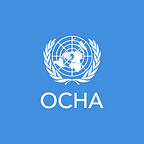Helping displaced women heal in Iraq
The same week that Salima Suliman Muza’a attained her Bachelor of Arts degree in Mathematics, her family was forced to flee its home in Sinjar, Iraq, as ISIS was attacking the area. They left everything behind.
While Salima was away at university, not living at home with her family, she was still traumatized by the loss. “We have lost friends, we’ve lost relatives,” Salima told OCHA. “We were devastated… Our hopes crashed because of what happened.”
The Muza’as were among thousands of Yazidi families who fled their homes with little to no notice. Most fled to Sinjar Mountain in Dahuk province in northern Iraq’s Kurdistan region, where many of them were then trapped for weeks on the mountain without food or water.
The Muza’as now live in a camp for internally displaced people in Dahuk joining the 3.3 million people who are internally displaced across Iraq.
Upon graduating Salima joined her family in Dahuk to begin her life as a displaced person. But shortly after arriving, her prospects improved when she was offered a job as a social researcher for national NGO, Women’s Rehabilitation Organization (WRO). The NGO was set up to protect women’s rights — particularly women affected by conflict or gender-based violence — and provides women with counselling, vocational training, financial advice and legal support, including official document retrieval.
“Every day I receive cases from women who would like to report their problems,” said Salima. Many show signs of depression or post-traumatic stress, she added.
While some of the requests are relatively straightforward, calls for help in procuring a replacement ID card for instance — others are more complex. Of particular concern are the traumatized women who have been kidnapped or in other ways abused by ISIS.
Most women who report to WRO have experienced some kind of loss or trauma, said WRO’s founder, Jihan Ibrahim Mustafa. “Every woman has someone — parents or other relatives — who are still in captivity or missing or who have been killed… All these people need assistance.”
Hezno, who lost her son on Sinjar Mountain, understands loss all too well. “We stayed on the mountain for seven days. We were hungry and thirsty and some of our children died, including children of my relatives, and my own son as well,” she said. “I was barely able to save my two girls,” she told OCHA. She has been attending counselling sessions at WRO.
Salima is slowly adjusting to her new life. She has exchanged her own room, personal possessions and computer, for a one-room tent with her family. But she has clearly found a sense of purpose. As she walks through rows of tents to visit clients, her face brightens. She greets residents and points out success stories on the way — a woman who found solace in a hair-dressing course; a newly blended family that Salima counselled to cope with strain; a woman who they helped to find new documents.
“We have lost a lot,” said Salima, “but helping these people makes me feel happy,” she said.
________________________________________________________________
